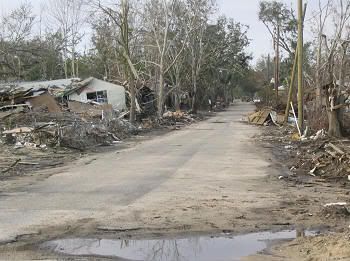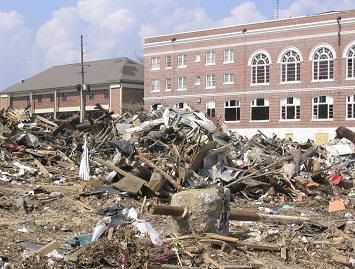Five Months Later and What Do You Get?
I haven’t written much about Hurricane Katrina since last year. I suppose I felt like all my essays were falling on tired eyes, which is not to say that people don’t care, but more that many people are in the same boat as I am: the problems are so complex, so vast, and so overwhelming that it just feels like a tear in a bucket. I know the history of New Orleans and so I have a grasp of how messed up things were before – and maybe that’s a helpful or maybe it’s a hindrance, something negative to focus on so that the worst self-fulfilling prophecies seem to be coming true. I have faith in the people of New Orleans. The politicians? Not so much.
I have heard from three separate, unrelated people that New Orleans is beyond desperate right now. Sure we, already KNEW that, but it’s not just Lakeview (although that still looks, five months since the Hurricane, like someone dropped a bomb on it), New Orleans East, or the Lower 9th (which looks like someone dropped five bombs on it).
My mother recently had occasion to go to the Post Office in Kenner – which, for those of you who don’t know, is a suburb of N.O. Kenner is quite developed (and even quite crowded) and has been that way for a while. My mom said that she doesn’t really like going to that Post Office because it is in “such a creepy area.” This confused me, because it’s across the street from the medical office building in which I worked for almost eight years, right next door to a Super Wal-Mart, and a few blocks from a long string of strip malls and a two story indoor mall.
When I asked her why she said it’s because there’s hardly anything open. They wanted to get lunch but they could find few places that were not closed. Closed, as in boarded up, as in “we don’t work here anymore,” not closed as in “pardon our progess.”
As I’ve said before, the main areas devastated by the failed floodwalls were Lakeview, New Orleans East, and the Lower 9th Ward (with parts of Uptown and Mid-City receiving slightly less severe damage). While there was some heavy damage in parts of Metairie and Kenner, it wasn’t consistent – some areas had houses with four feet of water in their homes; others were unscathed – and it wasn’t the full-on, smash a window and cling to a tree branch kind. So to hear that Kenner is struggling like this truly blows my mind.
At this point, it seems like things in the New Orleans area are just stagnating and not improving much at all. Businesses keep closing, buildings keep burning down, people are still living in tents, there still aren’t enough FEMA trailers, and now, evacuees who were living in hotels are getting kicked out. The squabbling of petty politics and the like is still going strong, which just makes me want to tear out my hair in frustration.
Now Mississippi, that’s another story altogether.
According to the Gulf Coast News website, only about 45 percent of the debris in Hancock County has been cleaned up. There are still people missing, five months after the storm. Very few businesses have been rebuilt or reopened.
The talk about “recovery” is a smokescreen for the lack of progress on many real issues. Local governments are still struggling with funds to operate day-to-day. Tens of thousands of homeowners have yet to see the first nail driven to rebuild their homes and while progress has been made to pick up the large debris, a staggering amount remains.
In addition, the smaller cities along the coast, such as Bay St. Louis, Long Beach, Waveland and Pass Christian, have lost a majority of their tax base. A possible merger of Bay St. Louis and Waveland has been proposed in an attempt to offset this problem. The Mayor of Bay St. Louis, Eddie Favre, was interviewed regarding this issue and what follows is an excerpt.
MP: “Let’s talk about the city’s revenues for the year – how did you make out with the property taxes?”
“We estimate we’ll be getting about sixty percent of the property taxes this year. The taxes, we were told, were discounted so that only about 80% was collected up to the hurricane, but taxes are always collected in arrears so that means we will see the most amount of money coming in this year for last year. Next year is where we are going to feel it. We’re looking at maybe 10-15% next year, which means we don’t know how we are going to do it unless we do something now to prepare – which is why we’re officially commissioning the study on consolidation. Next year we’re gonna be in serious trouble unless we do something ahead of time. BSL had very little flood insurance. Nothing major that would take care of the expenses we have now, so we learned a big lesson there – but hearing all the insurance stories, I doubt paying insurance would have helped us anyway.”MP: “What would help with the expenses?”
Favre: “What we really need is a comprehensive bail out package that takes into consideration operating expenses for the cities and the county. We’ve received millions of dollars in individual and damage assistance, but almost nobody is talking about the operating expenses these cities need to survive. We need the government to step in and help us with a bail out over a five, six, maybe seven year period until the houses are built, the businesses return, the casinos come back into full operation and property taxes can be collected again. (emphasis mine)
I feel terribly guilty for not calling my dad in Bay St. Louis every week like I should because it hurts me to hear his depressed, miserable tone of voice repeating statements like, “Nothing’s changed. We still don’t know anything. We don’t know what we’re going to do.”
I just don’t know what to say in response.

The caption from the website reads:
This is a typical street in Pass Christian, months after Katrina.

This is the debris in front of St. Stanislaus school, where my cousins hid out
during the storm with exchange students who had no way of getting home.
It is also a few blocks from where my father and stepmother’s house was.
No comments yet. Be the first.
Leave a reply


